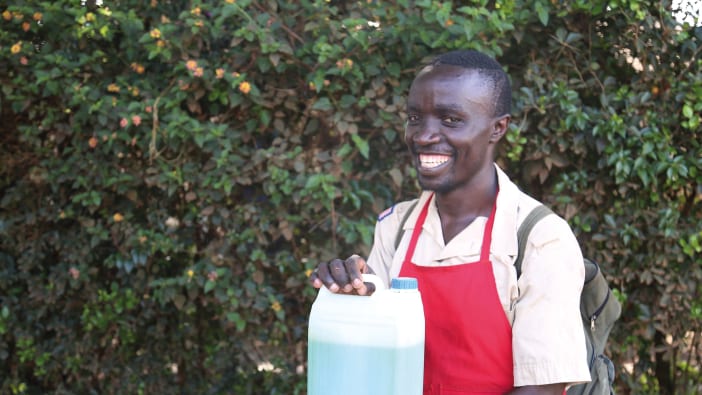Francis spent time with the people in Olendeem, building relationships with them. One of the exercises he uses is called 'Lighting the fire'.
In Olendeem, people took the invitation to dream their dreams very seriously. This was an opportunity to consider the fullness of life they believed God had for them. They wrote them all up on a large chart, which is pinned up on a wall in the room used as a development office. Within a year they had already achieved some of their dreams. In this isolated area, others, such as setting up a university within 25 years and a church diocese within 40 years, are still some way off!
Once people share their dreams, the community has to decide which should have priority. It is important to focus on one issue at a time, preferably one that can be achieved within a year or two. In Olendeem, most people saw improving literacy levels and education as the first priority. Some further information was needed so that people could better understand what prevented children attending school. Was it distance, poor facilities, poor teaching, lack of money for uniform and books, the need for children to help with livestock or the lack of parental encouragement?
Changing ideas
Local people carried out surveys and discovered that one problem was that many did not see the importance of girls going to school. Through their analysis they discovered that no girl had ever became a professional worker in their community (such as a teacher, nurse or secretary). The church worked hard to widen people's thinking about the value of education for girls. Now people say they would even sell one of their cows in order to educate a daughter!
A village development committee was established and people began work with enthusiasm. People in Olendeem had few financial resources but they had skills in building and a supply of red cedar. All families were asked to donate 1,500 shillings in order to employ a skilled carpenter and to buy a power saw. Each adult was expected to cut and carry 15 tree trunks from the forest. Land was cleared and a new primary school was built with four classrooms.
Living the dream
As the government failed to provide a teacher, the development committee employed one themselves. Within six months enrolment in the primary school had increased by 20% and in the pre-school by 60%. Numbers have continued to rise and now nearly all children of primary school age attend school. This year for the first time ever in Olendeem, 12 students took national exams and three went on to secondary school. Next year they hope there will be more.
Community members are now building two teachers' houses and pit latrines. Next on their agenda is the plan to build a secondary school.
'The process of community mobilisation opened our eyes. Now people can see ahead - they can see far,' said one of the members of the community.
Before the mobilisation there were few community groups. There are now several successful women's groups. People have gained huge confidence in themselves and their own abilities. Now they know that together they can do many things.
The church's role
The leaders and members of the local church have played a key role in the whole process. They invited Francis to come and begin the process of mobilisation. They have been committed to all the different stages and encouraged others to participate. They see the transformation of people's attitudes as part of building the kingdom of God. Church attendance has increased considerably and members have built a new church building nearby.
The mobilisation process in Olendeem has been repeated in similar communities around Narok (Kenya), Iringa and Musoma (Tanzania) and Soroti (Uganda). All could tell a similar story of the changes that have come to their communities as a result. These are exciting examples of holistic change in action. A new PILLARS guide about this process will shortly be available from Tearfund.










